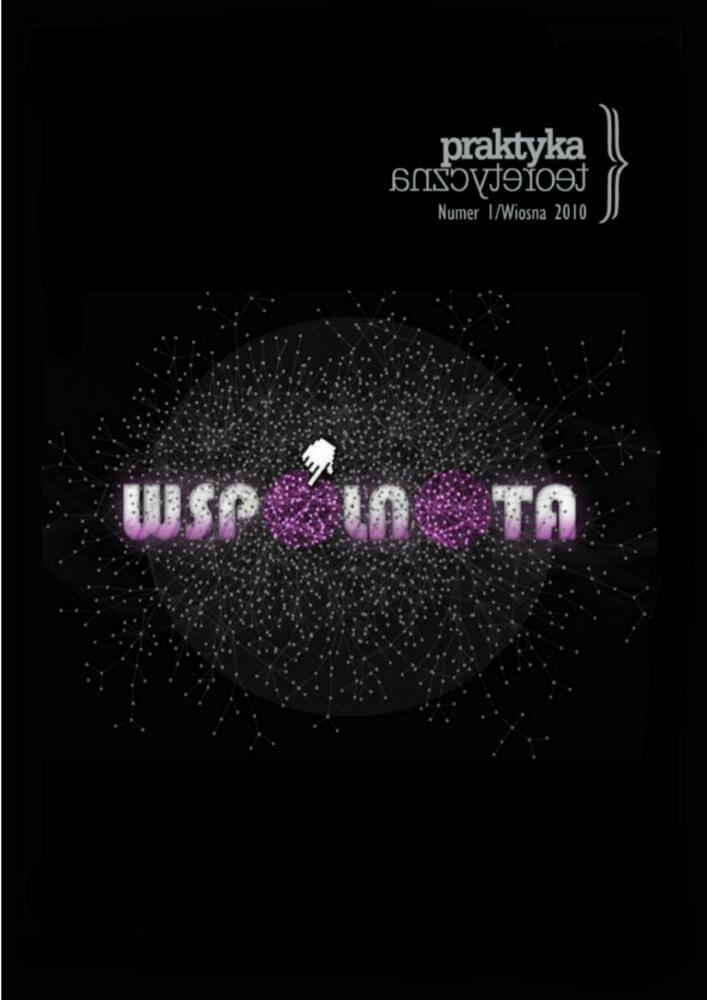Abstract
This paper is aimed at reconstruction of the basic ontological, epistemological and ethical premises of the posthumanist project (called also the posthumanist theory or the posthumanist tool), while analysing the theoretical propositions of Karen Barad, Gilles Deleuze and Felix Guattari as well as Donna Haraway. It is only by such meticulous definition of theoretical tool that one may be able to pose the question of the posthuman collective and posthumanist politics.
References
Barad K. 2003. “Posthumanist Performativity: Toward an Understanding of How Matter Comes to Matter.”. Signs: Journal of Women in Culture and Society. 28 (3) : 801-831 .
Barad K. 2007. Meeting the Universe Halfway: Quantum Physics and the Entanglement of Matter and Meaning. Durham-London: Duke Press.
Birke L., M. Bryld, N. Lykke. 2004. Animal Performances: An Exploration of Intersections between Feminist Science Studies and Studies of Human/Animal Relationships. “Feminist Theory”. 5 (2) : 167-183.
Bostrom N. 2010. What is Transhumanism? http://www.nickbostrom.com/
Bostrom N. A. 2005. “History of Transhumanist Thought”. Journal of Evolution and Technology. 14 (1) : 1-25.
Butler J. 1993. Bodies that Matter: On Discursive Limits of „Sex”. New York: Routledge.
Colebrook C. 2000. Is Sexual Difference a Problem? In Deleuze and Feminist Theory. Edinburgh: Edinburgh University Press.
Deleuze G. 2004. Desert Islands and Other Texts (1953-1974). Los Angeles: Semiotext(e).
Deleuze G.. Guattari F. 1987. A Thousand Plateaus. Minneapolis-London: University of Minnesota Press.
Deleuze G.. Guattari F. 1994. What is Philosophy? New York: Verso.
Derrida J. 2002. “The Animal that Therefore I Am (More to Follow)”. Critical Inquiry. 28 (2) : 369-418.
Foucault M. 1994 The Order of Things: An Archeology of Human Sciences. New York: Pantheon Books.
Graham E.L. 2002. Representations of the Post/Human: Monsters. Aliens and Others in Popular Culture. Manchester: Rutgers University Press.
Haraway D. 1991. Simians. Cyborgs and Women: The Reinvention of Nature. New York: Routladge.
Haraway D. 1997. .Modest−Witness@Second−Millennium. FemaleMan−Meets−OncoMouse: Feminism and Technoscience. New York-London: Routledge.
Haraway D. 2007. When the Species Meet. Minneapolis-London: University of Minneapolis Press.
Hassan I. 1977. “Prometheus as Performer: Toward a Posthumanist Culture?” The Georgia Review. 31 (4) : 830-850.
Latour B. 2004. Politics of Nature. Harvard: Harvard University Press.
Rossini M. 2006. “To the Dogs: Companion Speciesism and the New Feminist Materialism”. Kritikos. 3 (Sept) : 1-25.
Tuin I. Dolphijn 2009. R. Pushing Dualism to an Extreme: On Philosophical Impetus of a New Materialism.
License
“Theoretical Practice” seeks to put into practice the idea of open access to knowledge and broadening the domain of the commons. It serves the development of science, thinking and critical reflection. The journal is published in open-access mode under the CC-BY-NC-SA 4.0 license (detail available here: http://creativecommons.org/licenses/by-nc-sa/4.0/). Articles published in the journal may be freely distributed, stored, printed and utilized for academic and teaching purposes without restrictions.
They should not be, however, used for any commercial purposes or be reconstructed into derivative creations. Access to the journal may not be limited or offered for a fee by any third party.
Prospective authors are obliged to fill in, sign and send back the publishing contract compliant with the CC licencing. [PL.pdf, PL.doc, EN.pdf,EN.doc].
According to this contract, authors grant the journal a non-exclusive right to publish their work under the creative commons license (CC-BY-NC-SA 4.0) without any financial obligation on both sides of the contract.
Before submission authors should make sure that derivative materials they use are not protected by copyright preventing their non-commercial publication. Authors are responsible for any respective copyright violations.
